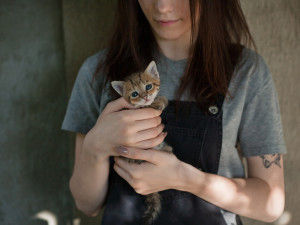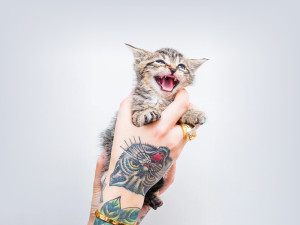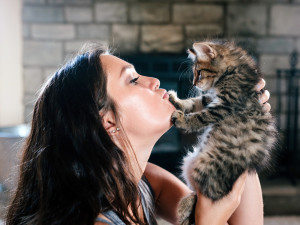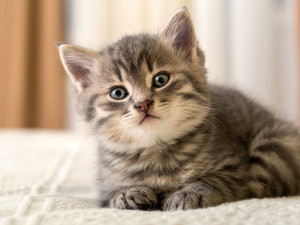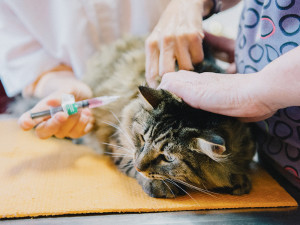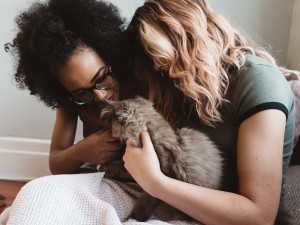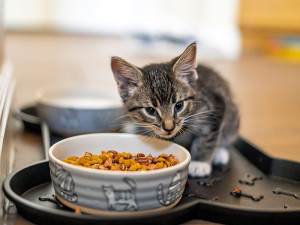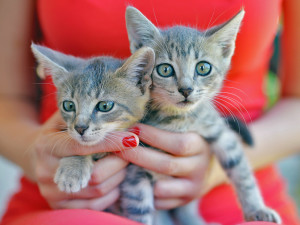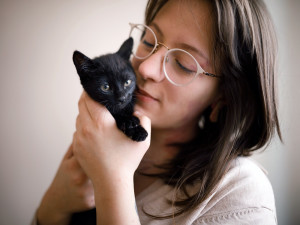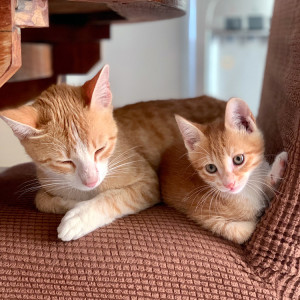What Is Fading Kitten Syndrome?
Newborn kittens give you lots to worry about. Know the signs of this particular condition.
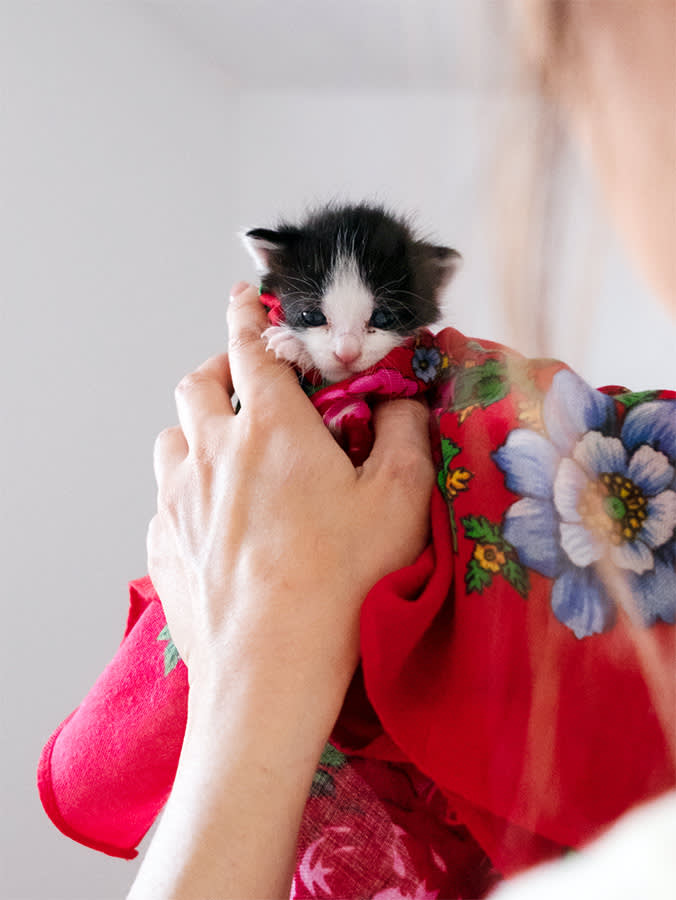
Share Article
In This article:
Causes of Fading Kitten Syndrome Symptoms of Fading Kitten Syndrome How Is Fading Kitten Syndrome Diagnosed? How Is Fading Kitten Syndrome Treated? How to Care for a Kitten With Fading Kitten Syndrome
Fading kitten syndrome is a serious condition that can lead to a kitten’s death. Symptoms include lethargy, lack of interest in nursing, pale gums, diarrhea, and vomiting. Early recognition and intervention are crucial for survival.
Fading kitten syndrome (FKS) is a condition in which newborn kittens fail to thrive between birth and weaning. These kittens appear to be born strong, but soon after birth they develop a combination of symptoms that cause them to “fade” — and often die. When facing FKS, some kittens can defy the odds with early and aggressive supportive care, but many do not live beyond the first week of life. Fading kitten syndrome can affect an individual kitten or the whole litter.
What are the causes of fading kitten syndrome?
Kittens develop fading kitten syndrome as a result of various genetic, physical, environmental, and disease-related factors. Causes of fading kitten syndrome include:
Infection
Sepsis (systemic infection) is the most common cause of death in fading kitten syndrome, and umbilical infections are a common source. Infections can affect a kitten’s respiratory system or gastrointestinal tract, and many lead to systemic illness. Common bacterial pathogens include E. coli, Streptococcus spp., Pasteurella, Clostridium, and Bordetella. The most common viral infections are feline herpesvirus-1 and feline calicivirus.
Malnutrition
Neonatal kittens should nurse every two to four hours and should steadily gain weight. Kittens may not get adequate nutrition if they are too weak to nurse, not allowed to nurse, or if their mom does not produce enough milk. Hypothermia (low body temperature) delays digestion and affects a kitten’s ability to absorb nutrients.
Issues during the birthing process
Dystocia, or a difficult birth, can contribute to the development of fading kitten syndrome. A kitten may not get enough oxygen during a difficult or longer-than-expected birth. Prolonged lack of oxygen can affect organ development and function. A kitten’s chance of survival can also be affected by premature birth, whether occurring naturally or via c-section.
Congenital abnormalities
Many kittens are born with abnormalities that cause them to be stillborn or die early in life. A cleft palate (gap in the top of the mouth) is commonly found at birth and is associated with other abnormalities. It also puts kittens at risk for developing pneumonia due to inhaling milk. Other possible birth defects include hernias, hydrocephalus (excess fluid in the brain), heart abnormalities, and atresia ani (failure to develop a rectal opening).
Environmental factors
Kittens can suffer adverse effects if an environment is too hot or too cold. Neonatal kittens cannot maintain their own body temperature and are prone to hypothermia. Cold kittens become too weak to eat and suffer from dehydration and poor digestion. Dirty environments place kittens at risk for acquiring infections or parasites.
Parasites
Kittens may struggle to grow and thrive if they face infestations from external parasites such as fleas and ticks, or internal parasites like roundworms, Giardia, or Toxoplasma.
Failure of passive transfer
Colostrum is the first milk produced by a mother cat shortly after giving birth. It’s rich in nutrients and provides antibodies that help kittens fight infections while their immune systems develop. Missing out on colostrum leaves newborn kittens at a great disadvantage in their ability to fight infections.
Isoerythrolysis
Neonatal isoerythrolysis is a rare but well-recognized cause of fading kitten syndrome. Newborn kittens with A or AB blood types can be born to moms with type B blood. When these kittens nurse, they ingest anti-A antibodies, leading to destruction of their blood cells.
Neonatal isoerythrolysis is more commonly seen in countries where the domestic cat population is more likely to have type B blood, like the United Kingdom. British Shorthairs opens in new tab and Devon Rexes are cat breeds most likely to have type B blood. In the United States, most cats have blood type A.
What are the signs and symptoms of fading kitten syndrome?
Some kittens with fading kitten syndrome may have obvious symptoms at birth, such as low birth weight or visible birth defects. Other symptoms take time to develop. Symptoms of fading kitten syndrome include:
Inability to nurse/suckle
Inability to gain weight
Inability to turn themselves upright
Poor appetite
Lethargy
Dehydration
Abnormal body temperature (hypothermia or hyperthermia)
Diarrhea
Continuous vocalization
Ocular or nasal discharge
Pale gums
Sudden death
At what age does fading kitten syndrome occur?
Fading kitten syndrome occurs in the first few weeks of life, from immediately after birth until weaning (typically four to five weeks of age). The first week of life is crucial, and many “fading” kittens will succumb to the syndrome during this period.
How do veterinarians diagnose fading kitten syndrome?
Because fading kitten syndrome does not have a specific cause that can be tested for, veterinarians depend on observation and clinical signs — it’s a “you know it when you see it” diagnosis. Vets will start by collecting the medical history of the mom and the litter. Helpful information includes the mom’s vaccination status, her level of interest in her kittens, any known difficulty during birth, and the environment in which she and her kittens are living.
Vets will also perform a physical exam to assess overall body condition, ensure reflexes are intact, and detect obvious congenital abnormalities. Kittens should instinctively suckle when given the opportunity and have the strength to flip themselves onto their belly when placed on their back. The vet will also look for signs of infection or parasites.
Diagnostic testing may include blood work, especially to check a blood sugar level and red blood cell count. Fecal examination and urinalysis may also be used to assess a young kitten’s health.
How do you treat a kitten with fading kitten syndrome?
Fading kitten syndrome treatment is supportive in nature. Almost all cases require measures to address dehydration, low blood sugar, and low body temperature; so vets will often provide fluid therapy, heat support, and supplemental dextrose. Treatment may also include assisted feedings, antibiotics, deworming, and blood transfusions, depending on the severity of the condition.
Can you cure fading kitten syndrome?
There is no specific cure for fading kitten syndrome. The goal of treatment is to get the kitten through the period of critical illness and support them until they are able to fend for themselves. This means they need help until they are eating well, gaining weight, maintaining body temperature, and thriving overall.
How to care for a kitten with fading kitten syndrome
“Fading” kittens require lots of special attention and extra support. Here are some tips for providing fading kitten syndrome help.
Keep kittens warm — but not too warm: Newborn kittens should be kept warm. An ambient temperature of 80 to 90 degrees Fahrenheit is ideal. If using artificial heating, be sure the kittens are able to scoot away from it if they get too warm.
Ensure kittens are getting adequate nutrition: Newborn kittens should nurse every two to four hours. If they are not strong enough to nurse, mom won’t let them nurse, or they always seem hungry, talk to your vet to determine if supplementation is needed.
Weigh them daily: One of the hallmarks of a “fading” kitten’s failure to thrive is a failure to grow. Kittens should gain weight daily, so using a small scale to weigh them once or twice a day will help you know if they’re growing like they should.
Keep them clean: Make sure the environment is kept clean and free of fleas and other parasites.
Seek professional help: At-home care is often not enough for fading kitten syndrome. If a kitten isn’t doing well, have them seen by a veterinarian.
FAQs (People also ask):
Can a kitten survive fading kitten syndrome?
Some kittens can survive fading kitten syndrome with early and aggressive supportive care. Many “fading” kittens, however, will die within the first week of life.
Can fading kitten syndrome be contagious to other kittens or cats?
Fading kitten syndrome itself is not contagious. However, if a kitten with fading kitten syndrome has an underlying infection or infestation, there’s a possibility of transmitting the infection to other kittens.
Should you hand-feed a kitten with fading kitten syndrome?
Kittens facing fading kitten syndrome often experience malnutrition and may need supplementation. Hand-feeding is not suitable for a nursing kitten. If your kitten is not nursing adequately, consult your vet for guidance.
How do kittens get fading kitten syndrome?
Kittens develop fading kitten syndrome as a result of various genetic, physical, environmental, and disease-related factors. Sepsis (systemic infection) is the most common cause of death in fading kitten syndrome.
Resources:

Dr. Alycia Washington, DVM, MS
Alycia Washington, DVM, is a small animal emergency veterinarian based in North Carolina. She works as a relief veterinarianopens in new tab and provides services to numerous emergency and specialty hospitals. She also works as a veterinary writer with a focus on educating pet owners.
Related articles
![Two women, one with dark curly hair and deep skin and one with pink-blonde hair and lighter skin petting their grey cat]()
Yes, You Should Spay/Neuter Your Cat. Here’s Why
A veterinarian breaks down how it keeps your pet healthy and curbs kitten overpopulation.
![Kitten eating dry food from a bowl.]()
Can a Kitten Eat Dry Food?
And the nutrients you should make sure they’re getting.
![Bengal cat with a calculator, bills and coins on the background of the room.]()
Kittens Are Smarter Than Puppies, Study Says—And Really Good at Math
They aren’t exactly CPAs, but they can probably tell you which piggy bank has more coins in it.
![Woman holding two young kittens.]()
Why Kitten Season Is Getting Longer and More Intense Every Year
And what you can do to help.
![Relaxed girl holding a black kitten near her face.]()
What to Expect When Fostering a Kitten
Besides plenty of cuteness, of course.
![Ginger cat mom and kitten resting.]()
Kittens Really Need Their Moms—Science Says So
The “I’m just a baby” TikTok sound definitely applies here.

